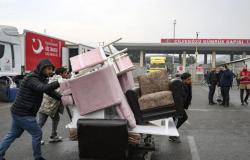The food situation in Senegal could reach a critical level in the coming months. According to a report in Le Quotidien, up to 1.3 million Senegalese are likely to find themselves in a situation of “critical to worse” food insecurity between May and July 2025. This possible crisis stems from a lack of production agricultural this year, considered the worst in a decade. Despite the assertions of the Minister of Agriculture, Mabouba Diagne, announcing a production of between 700,000 and 800,000 tonnes of peanuts, other voices are raised to contest these optimistic results and on the contrary evoke a worrying situation.
In Ziguinchor, the results of the peanut collection by Sonacos are significant of this failure, with only 380 tonnes collected for a target of 80,000 to 100,000 tonnes. The regions of Tambacounda, Kolda, Kaolack, Fatick and Kaffrine also observed a very slow start.” A villager from Nioro cites the alarming figures of his harvest: “last year we harvested 3,000 kg of peanuts, this year only 500 kg”.
The significant drop in production is not limited to peanuts. Cereal production also remains unknown, while expectations were high at the time of Diagne's appointment, which aimed for “record productions”. However, bad weather, floods and poor harvests add uncertainty to the current situation.
According to experts from the Interstate Committee to Combat Drought in the Sahel (CILSS), around 94,197 people will soon find themselves in a food emergency due to annual deaths in agricultural production. Entire communities are already experiencing extreme food tensions, particularly in the departments of Tambacounda and Koumpentoum. If in 2023, 83% of the population was food secure, new figures suggest a rapid deterioration of conditions. With cereal production increasing by 16%, the authorities are striving to compensate for the fall in commercial crops.
The Harmonized Framework, a tool adopted by ECOWAS member states and managed by CILSS, helps coordinate the food response by measuring security and anticipating periods of crisis. This framework is built through collaboration between the Executive Secretariat of the National Food Security Council (Se/CNSA) and its partners, including international NGOs. However, without significant strategic rectifications, Senegal will have to face the realities of major food insecurity depicted by CILSS and reported by Le Quotidien.






